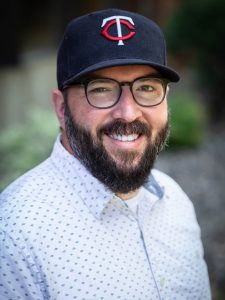 By Nicholas Tangen
By Nicholas Tangen
Last week, John Hulden and I spent three days in Indianapolis meeting with other leaders who have received a Thriving Congregations grant from the Lilly Endowment. Each day we gathered for worship, listened to the stories of project leaders and participants, and met in small groups to process the work we’ve all done over the past couple of years. It was a very helpful time for me as the director of a pilot project (Faith Practices & Neighboring Practices) and it really helped to clarify some of the key tensions and opportunities for the work ahead.
In one small group session, participants discussed the fluid and emergent nature of Christian community – how plans, curriculums, and systems often fall apart in the face of genuine and mutual relationship with God and neighbor. We talked about how, as project leaders, to convene space that makes room for the Holy Spirit to do that messy work, and each of us gave examples from our own lives of times when our relationship with God was transformed. And as we talked, I was overwhelmed by a rush of images and memories of my two grandmothers and was struck by the simple but immense impact these two women have had on my life and my faith.
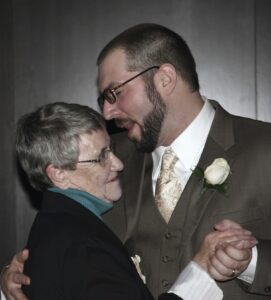
Nick dances with Grandma Joan at his wedding
“Plans, curriculums, and systems often fall apart in the face of genuine and mutual relationship with God and neighbor.”
Grandma Joan, my dad’s mom, grew up and lived her whole life in one small town in Northern Minnesota. She was quick to laugh, stern in correction, and exuded a kinetic and always determined energy. My memories of her are full of yard work, cooking leftovers, hanging laundry, church basement volunteering, and trying to keep up with her as we walked to the Benjamin Franklin for crafting supplies. In everything, she was diligent and intentional – and she maintained a disciplined daily routine that encompassed meals, work, and free time.
My most precious memories of her include us seated around her kitchen table – directly underneath the well-known colorized photo “Grace” – where she would give me coffee with milk to dip gas station donuts in while we played cards. Over these card games, we’d talk about her family, and she’d share stories from her life.
I always looked forward to these table talks, because it was in these moments where my grandmother opened up and told me parts of her life story and the stories of my relatives. It made me feel immensely connected to her and my own history, and ever more curious about her life and experience.
GRANDMA MADONNA, my mother’s mom, grew up in St. Anthony, Minnesota, not far from where my spouse and I live today. Gramma Bruhn, as we called her, was raised Catholic by a very strict and sometimes cruel mother, but still had a very deep and intimate relationship with God.
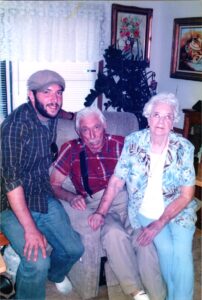
Nick sits with Grandma and Grandpa Bruhn
Her spiritual practices when I knew her, were praying the rosary and oil painting, which she learned later in life. She painted beautiful landscapes with big skies marbled with pinks, blues, and greens. When I visited her, we would often paint together, and she would graciously invite me to embrace my creative instincts and follow the brush. She was the first mystic I ever met in person, before I had any conception of what a mystic was.
“We are being asked to follow the creative process of the Holy Spirit, to do few things and to do them well.”
Later in her life, when my grandfather was nearing death, she showed me what it meant to accompany someone through the valley of death. One of my most treasured memories is helping her to get my grandfather ready for the night and then gathering for prayer around his bed. She would read prayers from her small prayer book; I would read a passage from Scripture; and we would close by praying the rosary together. In that room, with my grandparents, I encountered the Spirit of God holding us each in grief, love, and prayer and that experience will stay with me for as long as I live.
AS I REFLECTED on these memories with my small group in Indianapolis, I was struck by how much I had learned about community and faith from these two women. They taught me by the way they had both convened space where the Holy Spirit could show up in our relationship and our time together.
From Grandma Joan, I learned that there is no better place to build a relationship than around the kitchen table. I learned that everything we do is an opportunity to be intentional and purposeful, that a disciplined practice makes for an intentional day, and that the greatest tool for connection is sharing stories.
From Gramma Bruhn, I learned to let go and trust the Holy Spirit’s creative process, to get curious about color, form, and motion. I learned to pay attention to the world with an artist’s eye, knowing that there is beauty in the everyday. I learned how to accompany another person in prayer, how to appreciate tradition and the church, and how to believe immensely in the power of prayer.
The other small group members shared similar stories of connection, family, community, prayer, and simplicity. And we asked ourselves: “What would our community engagement look like if we centered these qualities? What would our faith formation look like if we centered these qualities?” What would we learn if we asked the grandmas in our communities to teach us their own unique spiritual practices and wisdom?
“We are experiencing an invitation to simplicity, to vulnerable and mutual relationships, and to the slow steady work of building connected and resilient communities.”
More and more, I am convinced that the church is experiencing a gracious invitation. It’s not to more and more, not to greater complexity, not to whatever we mean by “innovation.” Instead, I think we are experiencing an invitation to simplicity, to vulnerable and mutual relationships, and to the slow steady work of building connected and resilient communities.
We are being asked to follow the creative process of the Holy Spirit, to do few things and to do them well, to accompany one another in prayer, and to gather up around the table, trusting that God will meet us there. Maybe we are being invited into a spirituality deeply held and practiced by the grandmas. Maybe?
Neither of my grandmothers are still living, but I pray that their wisdom and their way of being will continue to live on in me and my family. I pray that each of us and each of our communities will look to the grandmas and see what we might learn about being church in this moment. Their wisdom, their stories, and their ways of being are a grace and nourishment for those of us drawn together around the table of Christ.
 By Jack Hurbanis
By Jack Hurbanis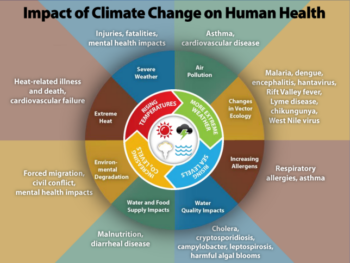
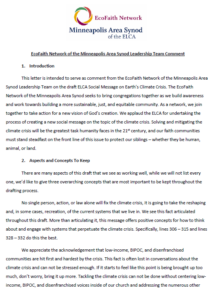
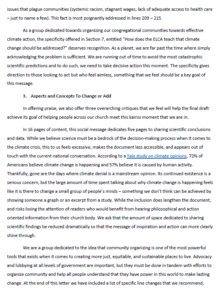
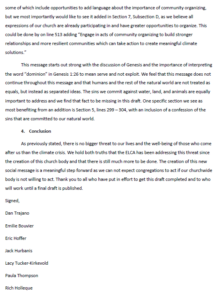
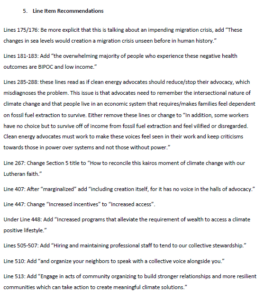


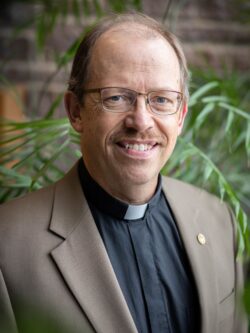
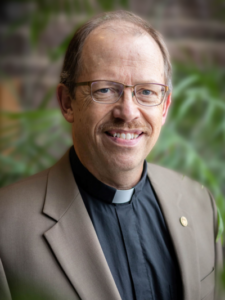 By Pastor John Hulden
By Pastor John Hulden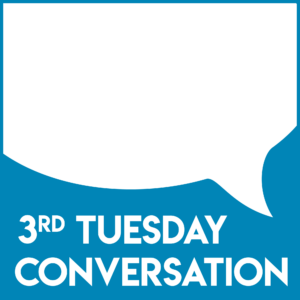
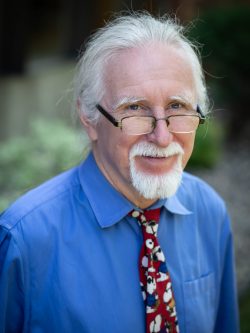
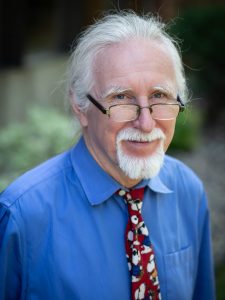 By Bob Hulteen
By Bob Hulteen 
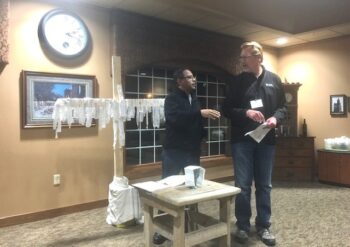
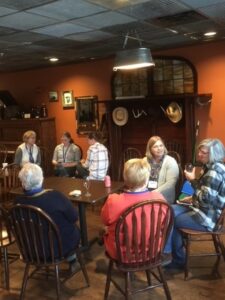

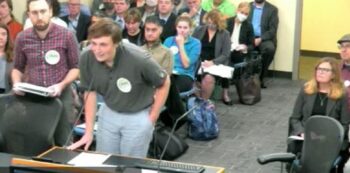

 By Maya Bryant
By Maya Bryant 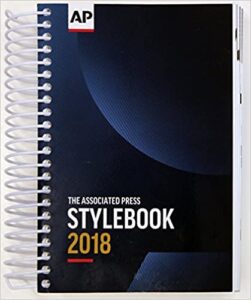
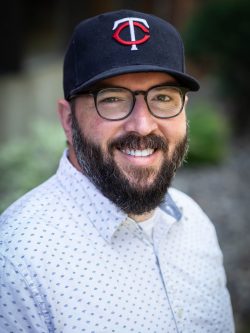
 By Nicholas Tangen
By Nicholas Tangen

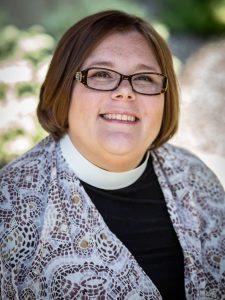 By Pastor Norma Malfatti
By Pastor Norma Malfatti 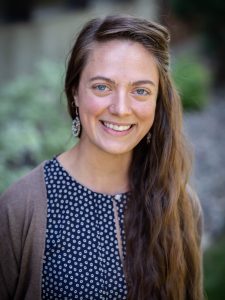 By Emilie Bouvier
By Emilie Bouvier
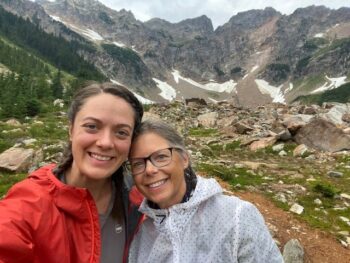 Sure enough, on night two of the hike, the bugs were wreaking havoc on us, which I had wholly not anticipated. With temps in the high eighties, rivers of sweat flowed under our rain jackets and rain pants that shielded us from swarms of insects while we set up camp for the night. Still, as we took shelter in the cramped mesh tent, we spent the evening telling stories, watching the sunset, and laughing our way through the ritual of killing the 15 mosquitoes that flew in the tent every time we entered or left. Instead of being miserable, we rolled with the punches and enjoyed what we could.
Sure enough, on night two of the hike, the bugs were wreaking havoc on us, which I had wholly not anticipated. With temps in the high eighties, rivers of sweat flowed under our rain jackets and rain pants that shielded us from swarms of insects while we set up camp for the night. Still, as we took shelter in the cramped mesh tent, we spent the evening telling stories, watching the sunset, and laughing our way through the ritual of killing the 15 mosquitoes that flew in the tent every time we entered or left. Instead of being miserable, we rolled with the punches and enjoyed what we could.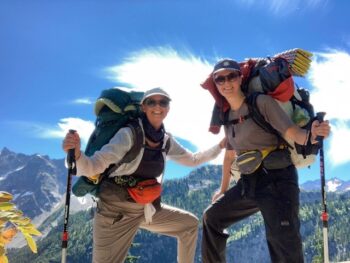


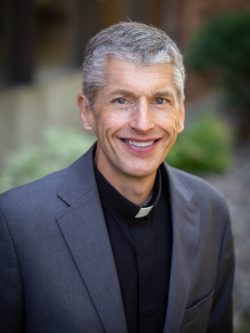
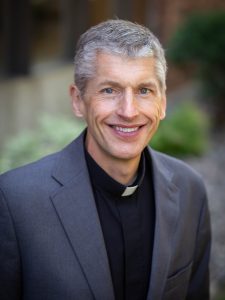 By Pastor Craig Pederson
By Pastor Craig Pederson